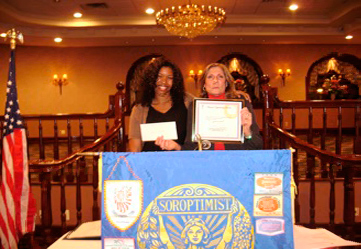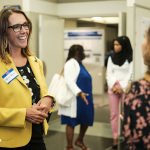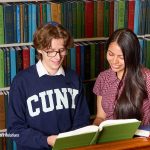Alvin Hillary and Deja Latrese Mullings, two students enrolled in CSI’s Teacher Education Honors Academy (TEHA), spent one month this summer student teaching at La Escuela Tomas de Berlanga, a K-12 school situated in the highlands of Santa Cruz, one of the many islands that make up the Galapagos archipelago.
View the CSI Today Photo Gallery.
Alvin, a senior in the Teacher Academy, and Deja, a junior, traveled to Santa Cruz in July with Dr. Susan Sullivan, Professor of Education, to begin month-long stints as student teachers.
“CSI is the only school that offers student teaching in the Galapagos,” Dr. Sullivan commented proudly, adding that the several bilingual teachers at the school helped make for a “perfect transition.”
Alvin, who taught Biology, Chemistry, and Natural Science to the approximately 120 students, called the experience “a biologist’s dream.” Although he wasn’t fluent at the outset, Alvin taught in Spanish explaining that the terms described in the students’ texts were similar to those in English. He also said that the students were just as eager to learn English from him as they were to teach him Spanish. To the New York native, “it was odd how nice everyone was.”
Deja, who taught Math and observed Physics, spoke a little less Spanish than Alvin but was able to teach the universal formulas of the two disciplines in English, translating the texts from English to Spanish during off-hours. There was some difficulty assimilating to the living conditions in the Galapagos, due to factors like the undrinkable water. “There wasn’t even a movie theater,” Deja said.
The students were later joined by Dr. Irina Lyublinskaya, Professor of Math and Science Education, who served as a classroom observer and provided guidance to the two student teachers.
Dr. Lyublinskaya viewed the trip’s purpose as two-fold. The first priority was to take advantage of the school’s location. “The school is in a national park,” she said during an interview. She also claimed that the program was a “great experience from a scientific perspective. After all, what better place for science teachers to teach natural sciences than the Galapagos?”
Dr. Lyublinskaya’s other priority was to help La Escuela Tomas de Berlanga “take advantage of the ecological sciences of the Galapagos.” For her, the trip was all part of a bigger mission to incorporate technology into this natural science learning setting. Dr. Lyublinskaya called the program “a collaborative effort” and proposes that both sides will benefit from this collaboration.
For the CSI students, the experience was a beneficial one.
Alvin, who has completed his studies at CSI and is graduating in December, received a job offer just days after returning from the Galapagos.
Deja is using the experience to count toward her student teaching credits for the Teacher Academy and admits that “life is more stressful back home.”
Both consider the opportunity to travel to the Galapagos “an experience of a lifetime,” and they are planning to return next year when their former students, with whom they keep in touch via Facebook, graduate.
Dr. Sullivan and Dr. Lyublinskaya are hoping to receive enough funding to make the student teacher trip to the Galapagos a yearly endeavor.
The program was the brainchild of Dr. Sullivan and Dr. Lyublinskaya, collaborating professors in the Teacher Education Honors Academy at CSI. The seeds of the idea were planted several years ago, but how Alvin and Deja were able to take advantage of the opportunity is as much of a story as the trip itself.
Dr. Sullivan had plans to send students to Ecuador as long as six years ago, while helping to create the International Studies program for the then new CSI High School for International Studies. Sheila Roberts was the principal of a high school, Colegio Menor, in Quito, Ecuador with which the CSI High School was developing exchanges. When Roberts was named the newly appointed and first-ever bilingual director of La Escuela Tomas de Berlanga in the Galapagos, Dr. Sullivan realized it would be a wonderful opportunity for TEHA to collaborate with the school. The program was able to obtain funding through scholarships procured by Dr. Alfred Levine, the Acting Dean of Science and Technology, for two eager students.
The rest they say, is just part of natural evolution.

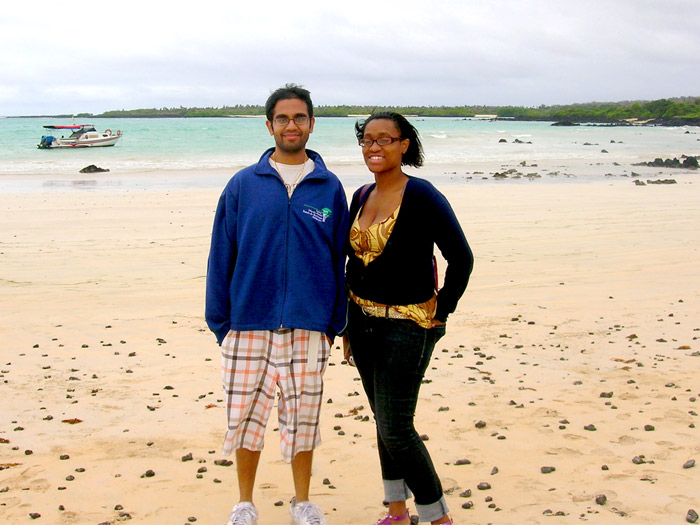

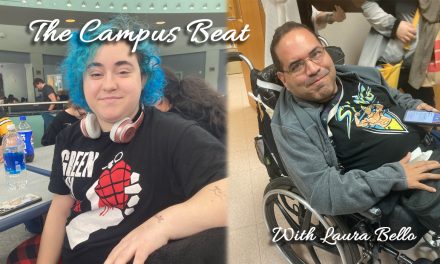
![[videos] “CSI’s Got Talent!” Wows Audiences for a Second Year!](https://csitoday.com/wp-content/uploads/2013/05/Talent-2013-Sami-Jo-Frank-1st-Place.jpg)
